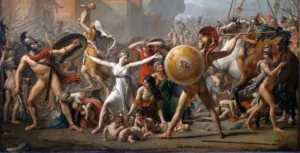One of the questions we often hear from Jews these days is how committed, serious, faithful Christians are able to stand by when their fellow Christians are being attacked, kidnapped, and murdered all over the world. Why, they wonder, are not all resources and opportunities being mobilized to save their brethren?
It’s a revealing question. Perhaps what seems to Jews to be a lack of Christian responsibility to other Christians comes from Christians far outnumbering Jews, who so keenly feel the importance of each individual. The answer is undoubtedly complicated by the fact that the Christianity of Middle East Christians is often unfamiliar to American Christians. Moreover, Middle Eastern Christians can feel foreign and even vaguely threatening to some American Christians due to cultural, linguistic, and ethnic differences.
We try to explain to these Jews that Christians do indeed have an idea like am yisrael, the nation of Israel. What some Christians like to call the “spiritual Israel” or “new Israel” that is to be found in the idea of the “mystical body of Christ”—the community of all believers—is based on and is in some ways analogous to the idea of the Jewish people. Despite the dizzying array of splits, denominations, and movements in Christianity, a notion of a single universal Church remains, however fractured or hidden it is in the world today.
The Talmud teaches “Kol yisrael arevim zeh bazeh” (Shevuot 39a), or “all of Israel are sureties/guarantors for one another.” The Ritva in the 13th century uses the same phrase to remind us that we Jews are all “one body” (Rosh Hashana 29a). Maimonides held that there is no greater mitzvah than redeeming those of the Jewish people who are held captive, fulfilling as it does so many basic laws of how they are to care for one another. The Shulchan Aruch in Yoreh Deah reminds that “[e]very moment that one delays in freeing captives, in cases where it is possible to expedite their freedom, is considered to be tantamount to murder.” Those are some vivid displays of a vibrant sense of mutual responsibility among the Jewish people.
Christian leaders in the Holy Land were offered a remarkable opportunity this week when Vice President Mike Pence visited. They were invited to bring the plight of their persecuted brethren in the Middle East to the world’s attention and to speak out in defense of their rights and freedoms at a time when the whole world would be watching, buttressed by the powerful voice of America. But instead of seizing this occasion and making full use of it to save their brothers and sisters, Middle East Christian leaders chose to prioritize their opposition to Israel.
Jews tend to notice that Christians often eagerly pray for one another, not to mention correct or condemn one another on points of doctrine. But, they ask, are Christians ready to actually save each other’s lives?
The mystical body of Christ is both a spiritual and physical entity. One would think, then, that a universal community of believers exists and needs to be supported by Christians not only in the spiritual realm but also in real, suffering human bodies. A weak, spiritualized concept of the body of Christ misses something essentially important for the survival of Christianity in an age of intolerance and savagery—that is, a robust concept of mutual responsibility.
Palestinian Christians may quite understandably resist and refuse President Trump’s embassy move to Jerusalem. They have every right to peacefully protest, write, argue, march, strike, and speak out vociferously in opposition. But the refusal of Middle East Christian leaders to meet with Vice President Pence means the loss of this opportunity to foreground the suffering and persecution of their fellow Christians in the world media. To have lost this opportunity in protest of Trump’s embassy move, and to thereby sacrifice the body of Christ on the altar of anti-Israel animus, is morally inexcusable.
—
Faydra Shapiro is a writer and the Director for the Israel Center for Jewish-Christian Relations and a Senior Fellow at the Philos Project. She can be contacted at [email protected].
Robert Nicholson is the Executive Director of The Philos Project and the Co-Publisher of Providence.
Photo Credit: Vice President Mike Pence visits the Western Wall in Jerusalem on January 23, 2018. By U.S. Embassy Tel Aviv, via Flickr.






 Live in the DC area? Sign-up for Providence's in-person events list!
Live in the DC area? Sign-up for Providence's in-person events list!